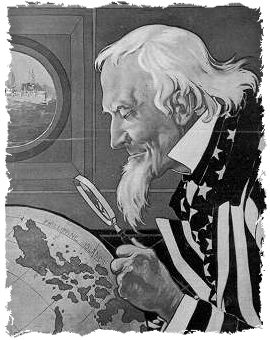Everything Old is New Again...

... and that seems to be the lesson in reading Stephen Kinzer's Overthrow.
While Kinzer, living as he does in his New York Times skin, seems to be a bit too generous in his views that sometimes overthrowing governments doesn't do a great deal of harm, there's a money quote with regard to today:
The scandal over torture and murder in the Philippines, for example, might have led Americans to rethink their country's worldwide ambitions, but it did not. Instead, they came to accept the idea that their soldiers might have to commit atrocities in order to subdue insurgents and win wars. Loud protests followed revelations of the abuses Americans had committed in the Philippines but, in the end, those protests faded away. They were drowned out by voices insisting that any abuses must have been aberrations and that to dwell on them would show weakness and a lack of patriotism.
American presidents justified these first "regime change" operations by insisting that they wanted only to liberate oppressed peoples, but in fact all these interventions were carried out mainly for economic reasons.
The case can be made that all "regime change" operations are carried out by the U.S. for economic reasons. As international law evolved, military intervention for the purposes of regime change disallowed that option, the primary reason why Bush reasoning for the invasion of Iraq shifted as frequently as it did. Bush simply could not, as previous presidents had done, begin with the easiest lie--that of freeing oppressed people. By 2004, that is the lie he ended up using, since it was the last which had not yet been disproved.
What Bush has accomplished, weird as it sounds, is a return to 19th century gunboat diplomacy for the benefit of business, using religion as its basis. McKinley, too, said he agonized over what to do with the Philippines, telling some Methodist ministers that he'd dropped to his knees in the White House and "prayed Almighty God for light and guidance." Only later did he note, to the delegation sent to Paris to negotiate terms with Spain, that his decision on the Philippines was to take advantage of "the commercial opportunity, to which American statesmanship cannot be indifferent." [quotes from Kinzer, p. 47]
Now, as then, too, the murder of civilians and torture of suspects have been decried, the outrage noted and then largely forgotten by the press. It was permissible because it was an expression of American exceptionalism--it was, ultimately, okay, because Americans were the ones doing it. We had a higher purpose. We were blessed by God.
Now, as then, there are insufficient numbers of people asking the fundamental question: "who benefits?" That's sort of the geopolitical equivalent of "follow the money."
The ordinary American has incurred his share of huge debt related to military misadventure, but has be benefitted in return? What benefits have accrued to the average citizen by invading Iraq?
The Philippine insurrection was subdued, at considerable cost to U.S. citizens, to maintain U.S. bases near China and Japan, bases which would be used to threaten those countries later. Today, we have several large bases in Iraq, from which we intend to threaten Asia once again. In 1900, the U.S. Navy needed coaling stations. Today, the U.S. air force needs runways and fuel and armament depots for its jets. Same-same.
And yet, there are now no bases in the Philippines. Citizens there came to see them as a blight on the physical and political landscapes.
How much will we spend to keep those bases in Iraq for decades? What will that implied threat against Asia accomplish? Will those bases precipitate a war in the future, just as those in the Philippines and Hawaii (yet another government overthrown for economic advantage at the point of a U.S. bayonet) helped precipitate the war in the Pacific in WWII?
We can continue spending huge amounts of blood and treasure to reinvent the past, to further enrich the already wealthy of this country. How much are we willing to spend to reinvent the future?

0 Comments:
Post a Comment
<< Home